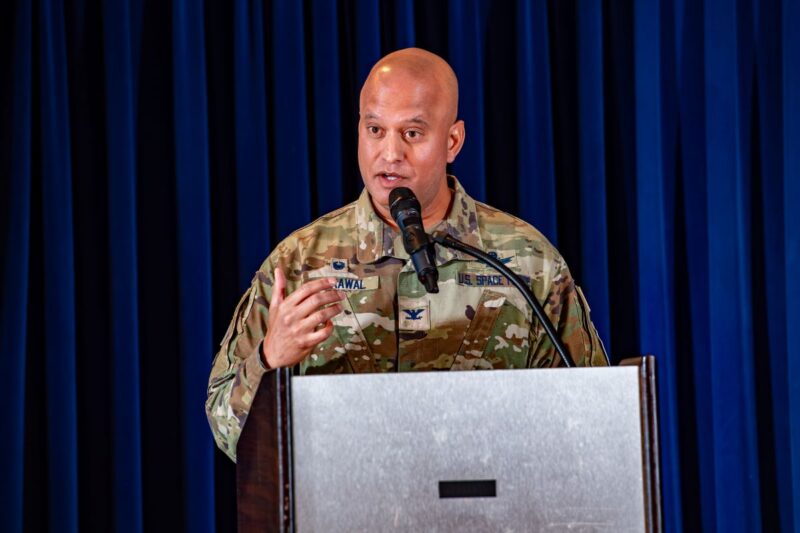Latest News

U.S. Space Force Col. Raj Agrawal, Space Delta 2 commander, gives remarks at Schriever Space Force Base, Colo., on June 18 Photo: U.S. Space Force Photo
The U.S. Space Force began an operational trial of L3Harris Technologies Consolidated Operational Data Archive (CODA) system on July 8, the service’s Space Systems Command (SSC) in El Segundo, California said. The trial will evaluate CODA’s integration of data from ExoAnalytics and the Air Force Research Laboratory’s Wide Area Search telescope system.
The automated CODA system “addresses two major challenges often associated with utilizing commercial or non-traditional data sources,” according to Peterson Space Force Base’s Space Operations Command’s Space Delta 2, the Space Force’s space domain awareness/space battle management arm. “First, data is often received from a wide range of commercial partners whose data are in different formats that is incompatible with current USSF C2 systems. Second, there are limitations with the USSF’s ability to implement quality control from these incoming data sources. Most importantly, this automated system breaks down the barriers between commercial, international, and U.S. government space situational awareness data and combines them toward a combined, coherent, common operating picture.”
SSC said that CODA will provide “a more complete picture of the space domain; automating the satellite tracking process in areas where U.S. government assets are not available.”
CODA is designed to allow U.S. satellite operators to react more quickly to potential threats.
The system “vets data for operational use and integration through a quality control algorithm that translates and compares data gathered from commercial and non-traditional providers with existing data within USSF’s unified data library,” SSC said. “Performing as both a translation and quality control tool, CODA enables global sources of data to securely enter USSF’s Operational C2 [command and control] systems. CODA translates multiple-format data sources to be compatible with USSF C2 systems enabling warfighters to make decisions faster.”
L3Harris is also developing the Space Force’s Advanced Tracking and Launch Analysis System (ATLAS), which the service has planned to enter initial operational test and evaluation in fiscal 2025.
Assistant Secretary of the Air Force for Space Acquisition and Integration Frank Calvelli said in February that he has convened regular sessions to right some space programs, including ATLAS.
The Pentagon’s Directorate of Operational Test & Evaluation’s fiscal 2023 report said that the expected fiscal 2023 fielding of ATLAS “was slowed by delayed capability delivery, system stability problems, lack of trained operators, and non-operationally representative test environments.”
SSC highlighted differences between CODA and ATLAS on July 16.
“CODA expands access to global sources of data to include commercial companies, other government agencies and international partners through translation and quality control algorithms that allow multiple-format data sources to be compatible with USSF C2 systems,” SSC said in an email.
ATLAS, on the other hand, which is to replace the Space Defense Operations Center (SPADOC), “is designed to modernize military Space Situational Awareness,” SSC said. “Modernization includes the ability to automatically identify potential anomalies and threats through the delivery of operational capabilities that monitor, track and display space objects with astrometric tools to support Space Domain Awareness (SDA), Command and Control (C2), and safety of flight support with superior analytics.”
The SPADOC space situational awareness computer system was established in 1979 at the North American Aerospace Defense Command’s Cheyenne Mountain Complex in Colorado.
“The development of CODA will enable ATLAS to access more commercial and non-traditional data sources in support of the SDA mission,” SSC said on July 16. “In the future, this will allow more commercial data sources that can be fused with U.S. Space Force, joint, and multinational sensors to enhance precision, fidelity and accuracy of information as well as form a common understanding of the national security space terrain with our allies.”
Lt. Col. Daniel Kimmich, materiel leader of SSC’s cross mission data branch, said in an SSC statement that “gaining entry into the operational trial period for CODA expands space data accessibility and provides our decision makers with crucial, actionable information in minutes not hours.”
Stay connected and get ahead with the leading source of industry intel!
Subscribe Now